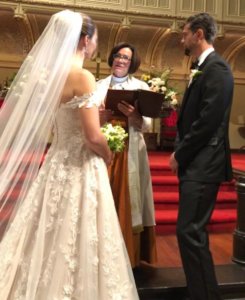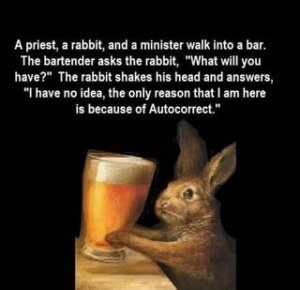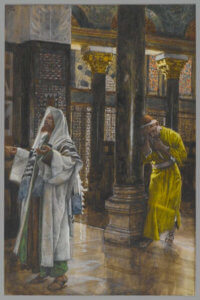
A Priest, A Minister, and a Rabbit
 Last week at this time, Jere and I were sitting on the front porch of The Columns, where Judson and Sofia’s wedding reception had been the night before, and where the wedding party was staying. The barista makes a fabulous latte, and having been to early church up the street, we settled in to drink coffee and catch up with family and friends as they wandered downstairs — none too swiftly for many of the younger ones, I’d have to say. I noticed quite a few tux jackets and shoes still on the floor from the festivities the night before. It was a very good party.
Last week at this time, Jere and I were sitting on the front porch of The Columns, where Judson and Sofia’s wedding reception had been the night before, and where the wedding party was staying. The barista makes a fabulous latte, and having been to early church up the street, we settled in to drink coffee and catch up with family and friends as they wandered downstairs — none too swiftly for many of the younger ones, I’d have to say. I noticed quite a few tux jackets and shoes still on the floor from the festivities the night before. It was a very good party.
Some of us there were family by birth — parents, siblings, offspring. Others were family by marriage. Many were family by choice — our very closest and dearest friends, bound together by years of shared experience, love, and commitment. Chosen family is not the least of these bonds of family — birth, marriage, and choice. After all, it’s through these choices that commitments are made, marriages formed, and children come.
We all gained new family through Judson and Sofia’s marriage, discovering new ways we’re all connected. Judson’s dear friend from college and I, good lawyer friends for about 10 years, welcomed Sofia’s brother as our new brother at the bar. He passed the bar exam just days before the wedding. And Sofia’s Uncle Bagley Reid, father of one of Jere’s early students at Woodberry Forest in Virginia and longtime Fisher’s Island and Newport acquaintance of Nick Brown, utterly charmed my mother and me, promising to visit soon here at Emmanuel.
Chosen Family
We have dear chosen family we met in Atlanta almost 30 years ago, and after 20 years or more of Sunday night dinners and joint family vacations, our kids travel together, have shared apartments in New York City, and have now taken over planning all family events. It was great to share parenting with them, both for perspective and for diversity. Our friend Kevin is Jewish, and Joan is Methodist, and we all loved it that way. Passover Seder was an important part of our time together. When Judson, the eldest of our four combined children, went off to college, he would not miss returning home for Seder for any temptation a weekend at school could offer. And Hannah, Joan and Kevin’s eldest, four days younger than our daughter Aubrey, was a frequent companion at All Saints’ where our family worshiped.
 Our spectrum of traditions was also a great source for humor, as it was Friday morning, when Kevin texted the basic setup for most “a priest, a minister, and a rabbi” jokes: Here it is: A priest, a minister, and a rabbit walk into a bar. The bartender asks the rabbit, “what’ll ya have?” The rabbit says, “I don’t know. I’m only here because of autocorrect.” Just for those who couldn’t quite hear, the bunny rabbit in this joke takes the place of the usual rabbi — as the result of the iPhone’s frustrating autocorrect features that undo all the correct words we have typed. John, maybe you can explain this to everyone at Coffee Hour. And this is Luke’s setup in our gospel this morning, even if he’s missing the priest and the rabbit:
Our spectrum of traditions was also a great source for humor, as it was Friday morning, when Kevin texted the basic setup for most “a priest, a minister, and a rabbi” jokes: Here it is: A priest, a minister, and a rabbit walk into a bar. The bartender asks the rabbit, “what’ll ya have?” The rabbit says, “I don’t know. I’m only here because of autocorrect.” Just for those who couldn’t quite hear, the bunny rabbit in this joke takes the place of the usual rabbi — as the result of the iPhone’s frustrating autocorrect features that undo all the correct words we have typed. John, maybe you can explain this to everyone at Coffee Hour. And this is Luke’s setup in our gospel this morning, even if he’s missing the priest and the rabbit:
Two men went up to the temple to pray, one a Pharisee and the other a tax collector, Luke’s story begins. The Pharisee, standing by himself, was praying thus, `God, I thank you that I am not like other people: thieves, rogues, adulterers, or even like this tax collector. I fast twice a week; I give a tenth of all my income.’ But the tax collector, standing far off, would not even look up to heaven, but was beating his breast and saying, `God, be merciful to me, a sinner!‘
Odd Pairing
Luke has put the Pharisee and the tax collector together here for a reason. We are supposed to wonder why, in this pairing, it’s the tax collector who is saved by his faith, and exactly what it is about the tax collector that we’re supposed to see and be. We know that Jesus is always making a bad example of the Pharisees in the gospels, showing us that the Pharisees are missing God’s forest for their focus on rules about the trees.
So are we all supposed to be the tax collectors? I don’t think we can jump to that conclusion. The wiki-thickets tell us that tax collectors are mentioned throughout scripture. Genesis 47:24 says that when the crop comes in, give a fifth of it to Pharaoh. Tax collectors were reviled by the Jews of Jesus’ day because of their perceived greed and collaboration with the Roman occupiers. They got rich demanding tax payments in excess of what Rome levied and keeping the difference. Well, that’s not good.
And the Pharisees weren’t bad people. They were the super-conscientious sect of Jews who had committed generations and millennia to learning and following God’s rules. The Pharisees are like the very most diligent of us. They worshiped on the sabbath, always remembered to pledge, loved the hymns, got excited about flowers on the altar, signed up as lectors, sang in the choir, participated in church work days, polished brass, volunteered in the office, and brought the gifts up at communion.
So what’s the Pharisee doing wrong in this story? I don’t know about you, but I know I can find myself doing what the Pharisee is doing. When I’m in a bind or I’m unsure of myself — I start looking around to see what others are doing — kind of checking out my own insecurities. What about him? Whoa — look at that. Looks like he spilled a little soup on his tie. Well, I have no idea what I’m doing, but my shirt’s still clean. I’ve got that going for me. Checking around on what others are doing is kind of a nervous tic — a self-soothing behavior that comes from a place of deep insecurity. I’m ok, right? At least I’m not as bad off as she is!
So if we’re usually the Pharisees in the story, why has Luke’s gospel given us a tax collector as the foil? Is Luke’s gospel telling us to sign on to greed and collaboration with oppressive systems of occupation? I don’t think so, even though Jesus loved the diminutive tax collector Zacchaeus, who climbed up in a sycamore tree in Jericho to better see Jesus, and Matthew the Apostle, who was also a tax collector.
False Comparison
 But I don’t think Jesus telling us to be like the Pharisee either — keeping score of the mistakes others make, to manage his own anxieties. Luke’s gospel has set up a false comparison — making us think it’s easy to pick the right answer — be like the Pharisee, or be like the tax collector. I think we’re supposed to be focusing on the Pharisee’s and the tax collector’s behavior, not their respective identities. Consider Luke’s gospel’s visual description here. The tax collector is bent down. He won’t even lift his eyes up to the heavens, Luke’s gospel tells us, but instead is beating his breast and calling himself unworthy.
But I don’t think Jesus telling us to be like the Pharisee either — keeping score of the mistakes others make, to manage his own anxieties. Luke’s gospel has set up a false comparison — making us think it’s easy to pick the right answer — be like the Pharisee, or be like the tax collector. I think we’re supposed to be focusing on the Pharisee’s and the tax collector’s behavior, not their respective identities. Consider Luke’s gospel’s visual description here. The tax collector is bent down. He won’t even lift his eyes up to the heavens, Luke’s gospel tells us, but instead is beating his breast and calling himself unworthy.
The Pharisee, on the other hand, can’t stop checking out what everyone else is doing. You’d see the picture Luke’s gospel is painting in modern day Jerusalem. The traditional kinetic prayer of ultra Orthodox Jews is called davening, a deeply embodied prayer that engages mind, heart, and body. Davening is also, when you see it, a really effective mechanism — a metaphor, in Luke’s gospel — for looking around and comparing ourselves to others, when we should instead be modeling ourselves on God. As former Andover Newton dean Mary Luti writes, the Pharisee is there to pray, but what he delivers is his own report card, thinking he’s doing pretty well compared with some of the other screw-ups around him — particularly that tax collector.
God is a passive audience whose job is to applaud when the Pharisee’s judgy report is done. Listening in, we learn nothing about who God is and what God does, but we do get a pretty clear idea about the Pharisee. The tax collector, on the other hand, seems have faith — that deep assurance of God’s kindness, even knowing his own weaknesses, and even though he’s never seen God. His faith tells him that God will be merciful, comparing him to others, but loving him incomparably because he’s made in God’s image.
Our God is a God of deep kindness,
who aches with our pain,
and would reach out in tenderness to comfort us,
giving us early rain for our vindication.
God will repay us for the years that the swarming locust has eaten,
the hopper, the destroyer, and the cutter,
and we shall eat in plenty and be satisfied,
and praise the name of the Lord our God,
who has dealt wondrously with us. Amen
